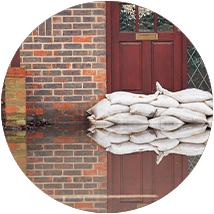Winter freeze
Sustained cold weather increases the likelihood of frozen pipes, along with the expense, disruption and inconvenience that goes with it. Both metal and plastic pipes will break when water freezes and expands.
We are just weeks into the winter season and it is a good time to check and see if your systems are ready for an onslaught of cold weather.
General Preparation
- Keep thermostats above 60 degrees for those areas that are poorly insulated every degree counts.
- Drain all pipes not in use or not used for fire protection.
- Check that insulation in basements, crawl spaces and other areas with pipe is still providing protection.
- Inspect all dry pipe sprinkler valves and fire pump rooms. To prevent freezing, keep a heater in all main sprinkler valve control rooms.
- Identify all main water valves and keep access to them clear in case those valves have to be closed in a hurry.
- Open doors from heated areas to the unheated areas to keep pipes in those areas sufficiently warm.
- Take thermometer readings during especially cold days to help determine those areas most vulnerable.
- Check to see if pipe sleeves and heat tapes are working.
Double Check Vulnerable Areas
- Pipes running against exterior walls
- Outdoor hose bibs, pool or outdoor shower supply lines and sprinkler lines that run through unheated or non-insulated spaces
- Exposed lawn sprinkler lines
- Supply lines in garages
If you had pipe freezing in the past – or near misses – anticipate a repeat unless you have taken preventive measures. Pipe- freeze occurring in one building that has the same design as other structures (such as multiple residential housing units built during the same project, “twin” schools or modular units) indicate the need to check the condition of the pipes in the other units.
Breaks or Winter Vacations
Down times such as school breaks during the winter are particularly worrisome due to less staff on hand to detect either malfunctioning heating or frozen/burst pipes, lowered thermostat settings for energy conservation, and renovations or repairs that expose pipes that are usually in confined areas.
Claim Reporting
Report frozen pipe claims to your insurance representative immediately. Wright Specialty has an emergency claim number that can be used when needed – 800 749-0948. Policyholders are required to mitigate damages caused by a covered loss. Reasonable and necessary expenses to prevent further damage are subject to coverage. Please consult with your insurance representative beforehand.
References
American Red Cross
http://www.redcross.org/get-help/how-to-prepare-for-emergencies/types-of-emergencies
City of Fort Worth Texas
http://fortworthtexas.gov/news/2017/12/freezing-pipes/
National Oceanic and Atmospheric Administration (NOAH)
http://www.crh.noaa.gov/images/ilx/pdf/Winter%20Weather%20prep%20guide.pdf
Compliment of Wright Flood: http://www.wrightspecialty.com






